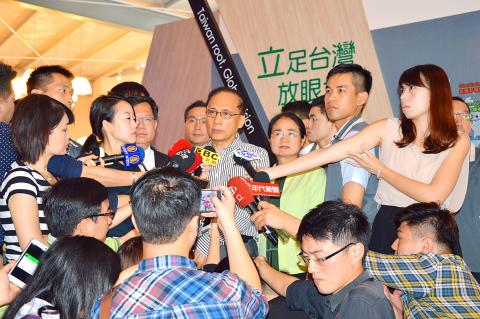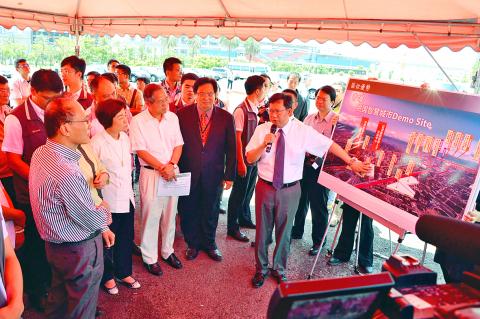Premier Lin Chuan (林全) yesterday vowed to reduce land expropriation and enhance communication with the public as the government pushes forward with the Taoyuan Aerotropolis project, which is to be a key component of a larger “Asian Silicon Valley” project that President Tsai Ing-wen (蔡英文) proposed during her campaign.
The premier made the remarks during a visit to Taoyuan to inspect the future site of the Asian Silicon Valley project, where he was briefed about a dispute between area residents and the government over the Taoyuan Aerotropolis project.
“Politically speaking, [the government] should reduce unnecessary land expropriation to avoid delays in the project’s progress due to protests by local residents,” Lin said in response to media queries for comments on the stalled project.

Photo: Hsieh Wu-hsiung, Taipei Times
“The government should also do its best to communicate with the public. I believe that [Taoyuan Mayor] Cheng Wen-tsang (鄭文燦) would help negotiate and he should not only follow the rules and regulations, but also pay attention to things that have been overlooked.”
“Better communication with the public should be the government’s attitude when dealing with land expropriation issues,” the premier added.
The Taoyuan Aerotropolis project, proposed by the then- Taoyuan County Government, comprises a new town around Taiwan Taoyuan International Airport with a free-trade zone, an expanded airport zone, an industrial exposition zone, an industrial zone, an agricultural zone, a coastal recreation zone, and residential and commercial zones, all of which would cover 6,845 hectares.

Photo: Hsieh Wu-hsiung, Taipei Times
In addition to land that has already been expropriated or developed, 3,130 hectares is to be taken from private owners, which has triggered mass protests from landowners, who took to the streets and filed lawsuits. In 2013, a farmer committed suicide, reportedly in protest over the land grabs.
“Taipei and Hsinchu are the right and left hands of Taoyuan, with Taipei being an international metropolis and Hsinchu being an important research and development hub for the IT industry,” Lin said. “We have chosen Taoyuan as the base for the Asian Silicon Valley project to revive the economy in northern Taiwan.”
Lin said that Taoyuan is also a good choice due to its robust industry, international airport and the Aerotropolis project.
He added that while the entire Asian Silicon Valley might take a long time to complete, the government would maintain its focus on it and regularly check on its progress.

INVESTIGATION: The case is the latest instance of a DPP figure being implicated in an espionage network accused of allegedly leaking information to Chinese intelligence Democratic Progressive Party (DPP) member Ho Jen-chieh (何仁傑) was detained and held incommunicado yesterday on suspicion of spying for China during his tenure as assistant to then-minister of foreign affairs Joseph Wu (吳釗燮). The Taipei District Prosecutors’ Office said Ho was implicated during its investigation into alleged spying activities by former Presidential Office consultant Wu Shang-yu (吳尚雨). Prosecutors said there is reason to believe Ho breached the National Security Act (國家安全法) by leaking classified Ministry of Foreign Affairs information to Chinese intelligence. Following interrogation, prosecutors petitioned the Taipei District Court to detain Ho, citing concerns over potential collusion or tampering of evidence. The

Seventy percent of middle and elementary schools now conduct English classes entirely in English, the Ministry of Education said, as it encourages schools nationwide to adopt this practice Minister of Education (MOE) Cheng Ying-yao (鄭英耀) is scheduled to present a report on the government’s bilingual education policy to the Legislative Yuan’s Education and Culture Committee today. The report would outline strategies aimed at expanding access to education, reducing regional disparities and improving talent cultivation. Implementation of bilingual education policies has varied across local governments, occasionally drawing public criticism. For example, some schools have required teachers of non-English subjects to pass English proficiency

NEGOTIATIONS: The US response to the countermeasures and plans Taiwan presented has been positive, including boosting procurement and investment, the president said Taiwan is included in the first group for trade negotiations with the US, President William Lai (賴清德) said yesterday, as he seeks to shield Taiwanese exporters from a 32 percent tariff. In Washington, US Trade Representative Jamieson Greer said in an interview on Fox News on Thursday that he would speak to his Taiwanese and Israeli counterparts yesterday about tariffs after holding a long discussion with the Vietnamese earlier. US President Donald Trump on Wednesday postponed punishing levies on multiple trade partners, including Taiwan, for three months after trillions of US dollars were wiped off global markets. He has maintained a 10 percent

TRADE: The premier pledged safeguards on ‘Made in Taiwan’ labeling, anti-dumping measures and stricter export controls to strengthen its position in trade talks Products labeled “made in Taiwan” must be genuinely made in Taiwan, Premier Cho Jung-tai (卓榮泰) said yesterday, vowing to enforce strict safeguards against “origin laundering” and initiate anti-dumping investigations to prevent China dumping its products in Taiwan. Cho made the remarks in a discussion session with representatives from industries in Kaohsiung. In response to the US government’s recent announcement of “reciprocal” tariffs on its trading partners, President William Lai (賴清德) and Cho last week began a series of consultations with industry leaders nationwide to gather feedback and address concerns. Taiwanese and US officials held a videoconference on Friday evening to discuss the